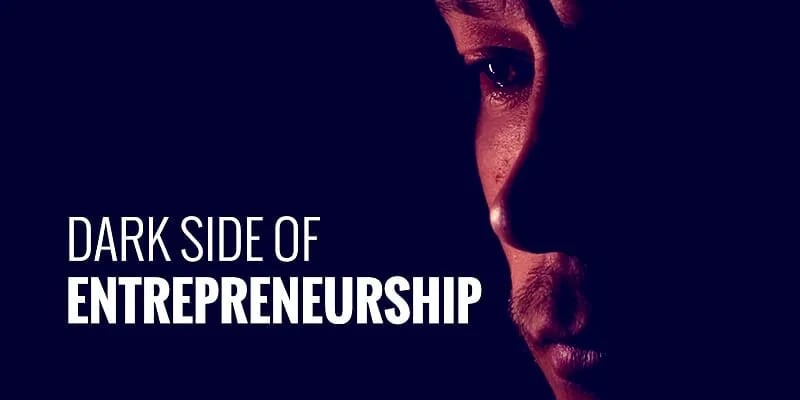THE ENTREPRENEURIAL BOARD
The Dark Side of Entrepreneurship
Prachi Sharma
9/27/20254 min read


Everyone wants to be an entrepreneur, but few truly understand the cost of building something from nothing.” In 2013, Aaron Swartz a tech prodigy who helped create RSS at just 14 and later co-founded Reddit was found dead in his apartment. At 26, he was carrying the weight of immense legal battles, startup pressures, and deep depression. His tragic story is a stark reminder that behind the glossy headlines of billion-dollar valuations and flashy exits, there is another reality. One filled with sleepless nights, crushing anxiety, broken relationships, and financial despair.
The Myth vs. Reality
We’re told that entrepreneurship means freedom, creativity, and wealth. In truth, it often means uncertainty, endless firefighting, and responsibilities no one else wants to carry. A global study shows that more than 90 percent of startups fail within their first three years. And yet, the world keeps glorifying the lucky few who make it big. The price people pay along the way is almost invisible. A study from UC Berkeley found that 72 percent of entrepreneurs struggle with mental health issues ranging from anxiety and depression to burnout and addiction. The “hustle” culture hides just how heavy this burden can become.
When Passion Turns into Burnout
Entrepreneurship is exciting, but it is also exhausting. Founders often work 80 to 100 hours a week. They go to bed thinking about problems and wake up worrying about money, growth, and survival. Over time, this pressure wears them down. Even Elon Musk once said, “Running a startup is like chewing glass and staring into the abyss.” Burnout isn’t just being tired. It clouds your judgment, makes you emotionally fragile, and sometimes, in tragic cases, leads people to end their own lives. Yet, in a world obsessed with hustle, talking about mental health often feels like admitting defeat.
The Money Gamble
Behind every startup is a financial gamble. Founders put in their savings, max out credit cards, or take out loans with no guarantee of return. While a job provides a steady paycheck, a startup only provides uncertainty. Travis Kalanick, Uber’s co-founder, once relied on credit cards to survive before funding came through. But not everyone is that lucky. Many end up in debt, with broken dreams and families struggling to pick up the pieces. This financial rollercoaster doesn’t just affect the founder. It strains marriages, damages friendships, and often leaves behind scars that last longer than the business itself.
The Loneliness of Leadership
Entrepreneurship can be one of the loneliest jobs in the world. As a founder, you’re expected to have all the answers for your employees, your investors, and your customers. But when doubts creep in, who do you turn to? A survey by Harvard Business Review revealed that half of all CEOs feel lonely, and most of them believe it hurts their performance. Employees see you as their boss, investors see you as their bet, and competitors see you as a threat. In the end, you often feel like
You’re carrying the weight of the world alone. That isolation can be just as damaging as financial pressure.
When Values Get Tested
In the race to survive, many entrepreneurs face tough moral choices. Do you exaggerate your numbers to get the next round of funding? Do you lay off half your team to buy a few more months of survival? Do you compromise your values just to keep investors happy? Some do. The result? Stories like Elizabeth Holmes at Theranos, who misled investors and patients. Or Adam Neumann of WeWork, who lost his company’s credibility after erratic decisions. The pressure to “win at all costs” often blurs the line between determination and deception.
The Toll on Relationships
Entrepreneurship doesn’t only consume the founder it consumes everyone around them. Families miss out on time together, partners feel neglected, and friends often drift away. The business becomes the other spouse. In fact, research shows entrepreneurs face higher divorce rates than average. When your startup is all you think about, the people you love end up taking the back seat.
Real Stories Behind the Curtain
Howard Schultz, who built Starbucks into a global giant, faced over 200 rejections before finding support. He admits the emotional toll nearly broke him. Nick Woodman, the man behind GoPro, once called himself the “mad billionaire” because his obsession with work left him isolated from his family and constantly battling stress. And then there are the countless small business owners who never get media attention the restaurant owners who lost everything during COVID-19, the shopkeepers overtaken by e-commerce giants, the local startups that fade away quietly. Their stories rarely make the news, but they are the true majority.
Why We Don’t Talk About It
Because the world loves winners. Investors want confident leaders, not vulnerable ones. Employees look for stability, not uncertainty. And society prefers to celebrate heroes, not admit that most people stumble. But by keeping quiet, we fuel the stigma. Founders are forced to act strong while they break inside.
Towards a Healthier Future
The solution isn’t to scare people away from entrepreneurship it’s to make it healthier and more sustainable. We need to normalize conversations about mental health in startup culture. Founders should be able to take breaks without guilt, seek therapy without shame, and admit struggles without fear of losing credibility. Work-life balance isn’t a weakness; it’s a strategy for long-term success. Peer networks, honest mentorship, and strong values can protect entrepreneurs from burning out or losing their way.
What We Can Learn
Entrepreneurship isn’t only about building companies it’s about the human cost behind them. The struggles with mental health, money, loneliness, and relationships are just as real as the victories. Most startups fail, but that doesn’t mean the people behind them should be forgotten or broken. The truth is simple success shouldn’t come at the cost of your health, your ethics, or your relationships.
Closing Thoughts
Entrepreneurship will always be a double-edged sword. It brings innovation, jobs, and change to the world, but it can also leave scars on the people who take that leap. The world doesn’t just need bold visionaries. It needs leaders who can dream big while staying grounded, who can build businesses without losing themselves in the process. Because maybe, the real measure of entrepreneurial success is not how high you climb but how whole you remain on the way up.
